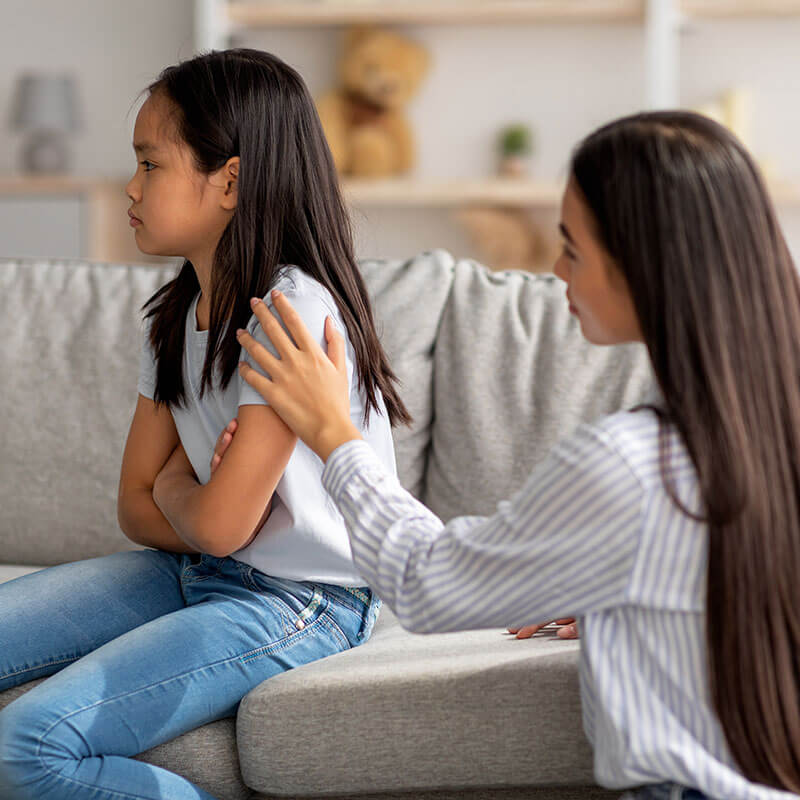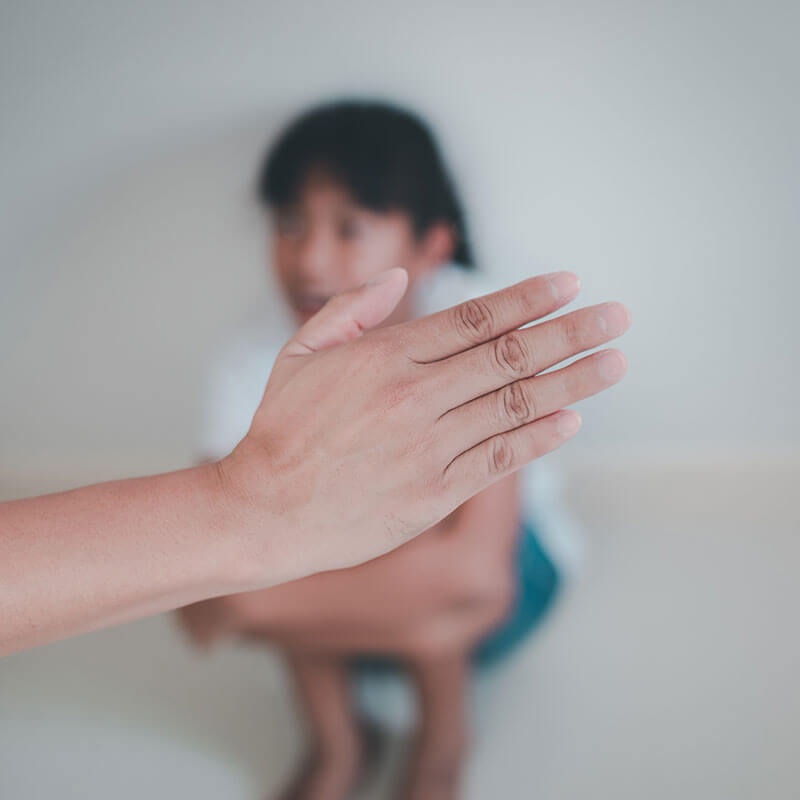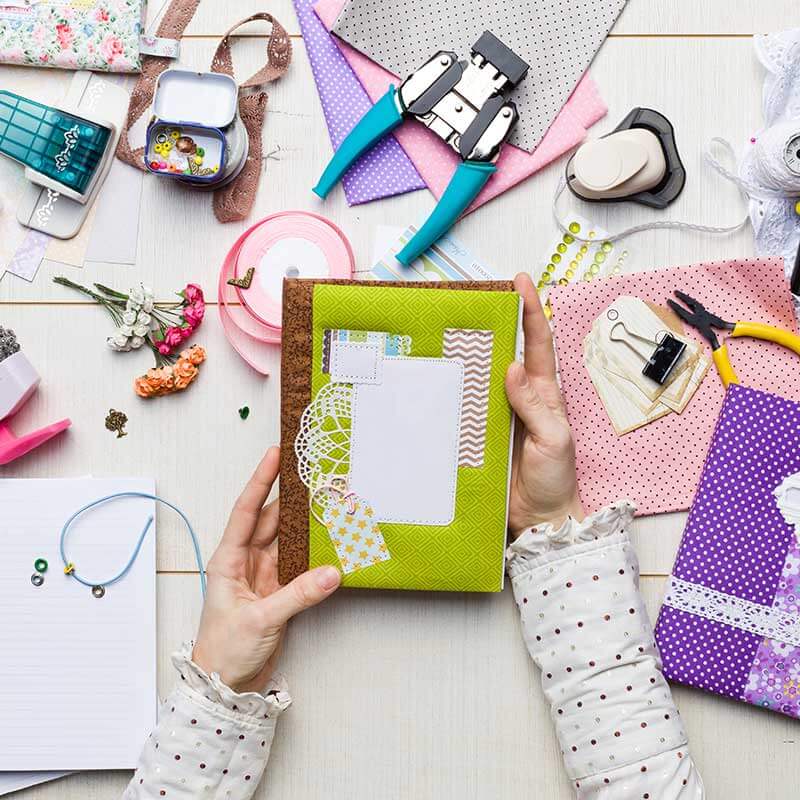-
![img]()
Why Is My Child So Secretive?
Zakwan Shah
November 17, 2024
5 min
We all have skeletons in our closets. Misdemeanors, white lies, sins of the past. There are so many things that we keep to ourselves and from our loved ones.
But then again, being an adult is tricky and wrought with peril. Which you can't say the same for childhood. After all, kids are terrible at keeping secrets.
But why does it feel like your little one is hiding something from you? Before rummaging around in their stuff for some clues, or worse, reading their diary, let's take a step back and understand why children, and teens especially, keep secrets from their parents.Why Do Children Keep Secrets?

Everyone has secrets; but there's a fine between privacy and secrecy.
Privacy is when you want something hidden due to it's value, sanctity or personal significance.
Secrecy is when you keep things from people out of fear or shame. Secrecy can be both good and bad.
Positive secrecy usually explore new feelings and ideas in a safe environment, away from the judgement of parents or peers.
Negative secrecy arises from the need to keep embarrassing, or even dangerous information from being found out.
Secrets can also sometimes be neutral, such as hiding a surprise or good news.
If your child is being secretive, it may be for a variety of different reasons.
But by and large, strict and/or judgmental parents are largely to blame for overly secretive children.
If you know your child well, you'll know when they're hiding things from you.
Still, it's important to note that most childhood secrets are innocent; they could have a boy/girlfriend, they're going through puberty, they have a secret club, etc. There may even be a chance that they're keeping secrets for others and not for themselves.
But there are a few red flags to watch out if you think your child's secrets are doing them more harm than good:- changes in personality
- changes in routine/patterns
- deteriorating health/depression
- anxious behaviour (bouncing leg)
- guilty behaviour (not looking you in the eye)
- avoidant behaviour (ignoring questions)
- physical evidence (unexplainable items, internet search history, etc.)
How to Deal with a Secretive Child
Reflect on Your Parenting

You know what they say, strict parents raise good liars. Or in this case, secret-keepers.
If you're an authoritarian parent (or suspect that you are one), it's time to reassess your parenting.
If you know for a fact that your kids are keeping secrets from you, they're probably not doing it for fun.
Kids usually become overly secretive because they've been punished harshly in the past for honest mistakes.
If you're overly strict and punitive in your parenting (or gossipy), your kids may not trust you. Not with innocent blunders and especially not with more important information.
So, instead of overreacting over 'small potatoes', as they say, keep calm and address the situation with a level-head. Your kids may be more willing to trust you with their secrets.Put Yourself In Their Shoes

We were all children and teens once, and we all may have kept some things about our lives hidden from our parents.
So, remember that the next time you're grilling your own kids about their secrets.
Remember how much you probably hated it when your own parents did that to you when you were younger.
In a way, keeping secrets is a natural part of growing up. It's a way of cementing your identity away from your parents and family.
So, don't be too harsh with your kids about any secrets that they may be hiding.
They may need some time to process the information.
In which case, your kids will tell you whatever it is they're hiding at their own time. Or when they know they can trust you.
Don't push it. There's nothing worse than a well-meaning but wrongly executed attempt at getting your children to reveal their secrets.Be More Open and Transparent

Avoid being a hypocritical parent. You know, the ones who will punish their kids for the same crimes that they themselves often commit on an occasional basis.
For instance, if you swear around the house but expect your kids to be polite little angels then that's not setting up a good precedent.
The same thing with secrecy. If you regularly dismiss your kids' questions about your personal life, or the lives of relatives, then you're not being an open parent.
But then again, you may not want to show that you're gossipy either, if so.
Gossipy parents are about trustworthy as strict ones.
A strict parent may be punitive, but a gossipy parent will peddle your secrets on the streets for anyone to hear. Or worse, to judgmental relatives who will pester you about it later during those dreaded family gatherings.
The trick with being an open parent is to create an environment in the home where your kids are free to express themselves without judgement or shame.Letting the Truth Come to Light

Some parents may lack self-awareness. They may wonder day and night why their kids are keeping things from them. Not knowing that they might be responsible for all the secrets.
Moreover, it may take longer for you to get your kids to 'fess up if you're guilty of being a strict parent.
They will probably never trust you enough to tell you what they're going through.
But you may be wondering when it's time to intervene. Especially if you're worried that your child may be involved with underage intercourse, banned substances, lewd material, etc.
Well, you need to have a serious, heart-to-heart with them about the dangers of those things.
Reassure them that they can tell you anything and that they won't get into trouble if they do.
But don't go back on your word once they do confess to you their deep, dark secrets. Resist the urge to start planning any punishments.
They've trusted you with an important secret, so don't break that trust. Instead, find a way to deal with it together.
Disclaimer: The information provided in this article is for informational purposes only and should not be considered as medical advice from Motherhood. For any health-related concerns, it is advisable to consult with a qualified healthcare professional or medical practitioner.
For more insightful stories and fun recipes, stay tuned to Motherhood Story!
-
![img]()
Brick by Brick – Building LEGO® Love for 90 Years
Sarah
June 03, 2022
2 min
To celebrate 90 years of Play, the LEGO® Group announces a new LEGO® Play Well Study that shows play is fundamental to the wellbeing and happiness of the whole family. Starting June, celebrate the creativity of fans and the power of play with more LEGO sets and activities!
Ninety years ago, a Danish carpenter crafted a line of small wooden toys in his workshop in Billund, Denmark. His first collection had a modest 36 items that included cars, aeroplanes, and yoyos, all carefully crafted to help local children learn about the world.
What Ole Kirk Kristiansen couldn’t have known back in 1932, was that the LEGO Group would become one of the biggest toy companies in the world and inspire millions of children to play each year.
Twenty-six years later, the LEGO® brick we know today was patented, with its interlocking tube system and endless creative building possibilities. Since then, our humble brick has been busy – it has formed the basis of over 18,000 LEGO products, received the Hollywood treatment in THE LEGO MOVIE™, helped children learn about robotics and coding through LEGO® MINDSTORMS®, and inspired hours of playful digital adventures in over 180 LEGO video games.
Throughout time, Ole’s passion for fun and high-quality toys has endured as his legacy. But play is not just about having fun. It is also integral to childhood development, overall happiness and family wellbeing.Celebrate at the LEGO Imagination Playground

As part of the LEGO Group’s 90th anniversary celebrations, LEGO fans can look forward to a physical installation at the ground floor of Centre Court, Mid Valley Megamall, from 1 to 12 June 2022. With various play-centric stations and activities for the public to engage with, LEGO Imagination Playground is a must-visit for both children and adults. For those down south, there will also be a second installation in Johor Bahru from 20 to 31 July 2022 at The Mall, Mid Valley Southkey.
Imagination Playground will showcase the endless potential of play and highlight why play matters in child development. Aside from fun activities such as the Cupcake Making Zone and Build & Race Zone, there are also stations that will transport visitors back in time as they revisit key milestones in the company’s history. One such station is The Memory Lane, which takes a look at the brand's 90-year history as well as The Tiny Block Theory, which details the history of the iconic LEGO Minifigure.
At the Endless Creativity Zone, LEGO fans can unleash their creativity and share their well wishes with LEGO DOTS bricks. Be it a LEGO build of a sushi platter or a designer handbag, the Imagination Playground immerses itself into its venue by showcasing unique builds from brands within Mid Valley Megamall at the Mall Tenants’ Creation Zone for all to see. For certain zones you can walk away with goodies by participating in the various activities.
The celebration doesn’t stop there! Visitors to Imagination Playground can look forward to redeeming a limited edition LEGO® 90th Anniversary Water Bottle with a minimum spend of RM299 or a 30581 LEGO® Tropical Parrot with a minimum spend of RM149. Additionally, one can redeem an awesome mystery gift with a minimum spend of RM199 on any LEGO DUPLO, LEGO City, LEGO Friends and/or LEGO Ninjago playsets. For in-store promotions (across all-channels), customers who spend a minimum of RM199 on any LEGO range, will be entitled to a limited edition 30510 LEGO® 90 Years of Cars from 9 June onwards, nationwide. These offers are available while stocks last.
Follow the hashtags #LEGO90Years, #LEGOMY #midvalleynow or visit https://www.lego.com/en-my/90-years-of-play to join in the fun!
For more insightful stories and fun recipes, stay tuned to Motherhood Story! -
![img]()
Generational Trauma and Parenting: How to Heal Your Family Tree
Zakwan Shah
November 10, 2022
5 min
There are many things that a parent passes on to their offspring. Genes, physical attributes, allergies. And yes, even trauma. While strictly a psychological phenomenon, traumas are as hereditary as eye colour and facial features.
Normal trauma is what an individual experiences personally in their lives. But generational trauma is inherited from your parents, grandparents and even your ancestors. They are negative and detrimental patterns that express subconsciously in your habits, fears, and in your parenting.
Everyone likely experiences generational trauma because all of our ancestors have at one point been embroiled in war, tragedy, massacres and other unpleasant events in human history like the World Wars. How we raise our children inadvertently perpetuates these predispositions.
But there are ways to shed light on the terrifying shadows of our past, so that the future generation can lead better, happier lives. Let's delve further together, shall we?Facts about Generational Trauma

A relatively new discovery in the field of psychology, generational trauma (often also called transgenerational trauma or multigenerational trauma) is trauma that is passed on from one generation to another. Oftentimes manifesting as unhealthy, learned responses to stressful events and situations.
The effects of this condition are twofold: biological and psychological. Trauma and other stressful events mutate gene expressions; your brain naturally changes to cope and adapt with your environment. Sometimes in ways that are detrimental to your mental health, especially if you're a child.
When you reproduce, you pass on these survival genes to your children, who will then pass those on to their children. These changes in gene expression can oftentimes result in succeeding generations having heightened flight-or-flight reactions. In other words, we see danger everywhere.
And if you don't heal your own generational trauma, you may risk further compounding the trauma through your own parenting method and habits. This will then likely end up compounding the hereditary stress responses to create more traumatic experiences for your children.
It is a vicious cycle. Future generations will become more and more anxious and depressed, who will then continue producing more anxious and depressed offspring.
And this is not counting families with a history of sexual and domestic violence, crime, drug abuse, poverty and alcoholism. These individuals may have a much harder time healing their ancestral wounds than someone who have led a relatively privileged life.
In order to stop generational trauma from influencing your parenting, you need to do some healing. So that you don't pass on the trauma of your ancestors to future generations.How to End Generational Trauma in Your Parenting
Attempt Some Shadow Work

Shadow work sounds like some scary black magic thing, but it's actually quite the opposite. Instead of bringing harm, shadow work brings healing and is a valid form of self-help.
It can be performed through a variety of techniques like meditation, intentional self-talk and journaling. To better understand what shadow work is, you first have to understand what the Shadow is.
According to psychologist, Carl Jung, your 'shadow' is a small dark corner in your mind where you have stored all your repressed desires, fears, emotions and even memories.
Just like Marie Kondo's decluttering technique, if a thought, belief or habit is no longer serving you, thank it for its service and throw it away.
One way to perform shadow work is to list out your stressors, how you naturally respond to them, why you respond in specific ways, and what you can do to minimise their power over you.
You can also do some inner child healing, which can further improve your shadow work and get your one step closer to healing your generational trauma. And if you're able to work with a therapist, doing so can likely help you increase your chances of success.Identify Trauma Responses

We often have instinctive responses when confronted with an unpleasant scenario. Some of us become defensive, aloof, antagonistic, resentful or passive aggressive.
These reactions may actually mimic those of our parents, or grandparents, and even our ancestors whom we've never even met. Sometimes they are learned, sometimes they are intrinsic. We often do them without even thinking.
While genetic predispositions to stress may be harder to overcome, you can reduce the tension in your interactions with your children by understanding your own trauma responses in your adult relationships.
How you communicate with your friends, partner/spouse, co-workers, and even strangers during moments of high stress can tell you a lot about your own generational trauma. And the way to overcome them is to do the opposite of what you normally would do.
Instead of getting angry, stay calm. Instead of being defensive, apologise. Again, working with a therapist can likely help you better identify your trauma responses compared to if you were to do so on your own.Stop, Breathe and Think

Generational trauma is most apparent during stressful situations. Just like during a fire emergency, you need to follow certain safety rules to put out the flames before things get out hand.
If you find yourself arguing with your spouse or children, or your boss, friend or co-worker, stop what you're doing. Take a deep calming breath and think about what you're doing—will your words resolve the issue or escalate it?
And if you must, excuse yourself to another room.
When dealing with naughty behaviour, or temper tantrums, it may be easy to employ your favourite torture device (hanger, belt, cane, etc). But know that resorting to corporal punishments is one of the main things that will propagate generational trauma in your lineage.
Remember, they used to cane prisoners back during the Japanese occupation, something that your ancestors had to live through. So, think about that next time you consider using physical pain as a method of behaviour control.Break the Vicious Cycle

Generational trauma may be sound like New Age pseudoscience to a lot of people. But that was what scholars thought psychology was back in the day. Now it's a respected and important field of medicine.
The concept of generational trauma may still be new. But the likely truth is that not many people may be willing to go through the time or trouble to resolve their inherited baggage.
Or rather, they are complacent in their own trauma. Resigned to the reality that it can never be healed. But there is always hope, and it is not as hard as it seems.
All this information may seem daunting, but don't be scared away. Baby steps is key, as always. Start small with a simple notebook and pen.
Then, find one area of your life and parenting that you may struggle with the most (chances are there is a generational trauma attached to that). And from there on begins the painful but worthwhile process of tending to your ancestral wounds.
Just this one act of healing can ripple throughout future generations, ensuring a better, happier life for all your descendants. And eventually, pave the way for a better and happier society for all.
Disclaimer: The information provided in this article is for informational purposes only and should not be considered as medical advice from Motherhood. For any health-related concerns, it is advisable to consult with a qualified healthcare professional or medical practitioner.
For more insightful stories and fun recipes, stay tuned to Motherhood Story!
-
![img]()
Money-Smart Mums Share Tips on How to Save for Your Child
Jia Ying
July 12, 2022
13 min
As parents, we never compromise when it comes to securing our children’s future. We naturally wish to provide our children the best opportunities in terms of wellbeing, safety, career, marriage, and financial security.
While we are busy working to fulfil our children’s basic necessities, it is equally essential to look into investing a long-term child savings plan.
Here’s why.
It’s not only about hedging against the drastic rate of inflation. We can also support our children better when it comes to healthcare, higher education, marriage and even starting a family.
By planning well and early, a sound child savings plan can help your children to deal with these future expenses without causing any financial strain. It can be a big relief for both you and your children, especially during your absence.
To provide your children the financial help needed in their adulthood, investing in a sound child savings plan is what you can do.
Read on and discover how you can provide your children the best in life. Here are 4 tips to help you decide on the best child savings plan for your little one.#1 Know Your Goals and Plan As Early As Possible

We understand that supporting our children financially in their adulthood can be extremely costly. Paying the first deposit of their new cars and houses, the expense of their wedding and even spending on their newborns are what you can expect.
The good news is that these big financial milestones are within reach if you plan well. And you can enjoy the advantage of time for your money to grow if you start investing early.
Mum of four, peah_ahmad, shared her views on the importance of starting early with a child savings plan:Financial literacy always starts from home. While educating our children on how to manage their money wisely, it is equally important for us to support our children financially throughout their life journey. And when we start early, we can reap greater rewards.
Indeed, when you invest early in a child savings plan, you will be able to have sufficient balance for other financial milestones by the time your children are older.
Starting early also means you can get maximum benefits out of a plan.#2 Choose Plans That Provide High Protection Coverage and Perks

It is essential for you to invest in a savings plan that provides returns that are sufficient to counter inflation in the long run.
Another mum, liyanajafry, added how investing in a sound savings plan can help her enjoy more rewards.A variety of offers and discount is available to us as the customers. We can enjoy services from gyms, optometrist and education centres at a cheaper price.
Here’s what another mum, ranechin, shared regarding how she selects a plan that can provide sufficient support for her child:Other than securing your kids' financial savings, you should opt for a savings plan that provides your children the best protection. Whether it is for the present or the future, look for plans that offer high coverage and protection for your children.
#3 Choose Plans That Allow Additional and Beneficial Riders

On top of this, we should opt for a child savings plan that allows us to provide our children with extra protection. This is made possible with insurance riders.
Riders are additional benefits that you can consider adding to your child’s savings plan. With this, you will be able to customise a policy that will give you comprehensive protection coverage.
Geozo, a mum of two, talked about the perks of including additional riders in her children’s saving plans:Other than the high coverage of the plan itself, the riders enable me to top up the life coverage up to five times of the initial amount.
Another mum, Azalia Suhaimi, agreed on the importance of securing better protection for her children as well:A good child savings plan should provide long-term protection and support beyond our children’s higher education. As we never know what may happen in the future, it is great that we can do our part to secure our children’s future aspirations.”
In fact, there are a variety of optional riders provided for the savings plan like accidental death and disability benefit or critical illness rider benefits. You can always consult the professional insurance experts to determine which riders suit the best interest of you and your children.#4 Choose Plans That Allow Better Investment Options

Another tip is to look into a savings plan in which you can enjoy great long- term investment opportunities. While your child will benefit from the product’s high protection coverage, you can also enjoy high potential returns while having the assurance that your wealth is being protected.
Here’s what Geozo said on having better investment options in her children’s savings plans:Protecting your wealth is possible by having additional investment through your children's saving plans. By investing and getting long-term returns from funds managed by professional and well-known fund managers, you can reach your financial goals effortlessly.
Secure Your Children’s Financial Future with AIA’s New Savings and Protection Plan
With thorough financial planning, you and your children can reach your financial goals. By breaking down your goals into smaller, feasible steps, you will be more motivated to invest in your children’s future.
As part of the AIA’s comprehensive Total Wealth Solution, A-Life Wealth Treasure is a savings and protection plan that offers high protection for your children with coverage starting from RM200,000.
You can help prepare for your children’s financial needs from as early as 14-days old. When you plan early, you can be rewarded with up to an additional 12% of your children’s coverage amount. And if you sign up early while they are still young, you can receive the first payout as soon as they turn 25.
If you wish to protect and support your children throughout their life journey, this savings and protection plan is an ideal choice for you. As it is an investment-linked plan, you can also gain exclusive access to global asset managers for potential higher investment returns whilst protecting your wealth.
Additional protection and benefits are also available for you and your children when you sign up for A-Life Wealth Treasure, attach the A-Plus ParentCare plan rider and become an active AIA Vitality member. By making healthy choices for your life, you can unlock cash rewards of up to 0.5% of the rider’s coverage amount, which will be credited into your child’s policy wealth account every year.
Head over to their official website for more information on AIA’s comprehensive Total Health and Wealth Solution for you and your children.
For more insightful stories and fun recipes, stay tuned to Motherhood Story!
-
![img]()
Why You Should Get Your Child into Journaling
Zakwan Shah
October 26, 2024
5 min
We all grew up watching The Princess Diaries, Bridget Jones and Harriet the Spy. Well, most of us.
Younger parents may not remember these oldies but to those who do, you may be avid journal-keepers yourself now as full-grown adults. Endlessly jotting down your thoughts, ideas, frustrations and experiences on the pages of a notebook.
All of us may keep a diary for various reasons, and some may have even started out in their journaling journey pretty young.
So, it's definitely a good hobby to cultivate in your little one.
While younger kids may not have the motor dexterity to write as gracefully and legibly as their older counterparts, encourage them to journal anyway. It may open doors to improving a bunch of useful skills.
But if you don't journal or are new to the practice, you may be wondering, what are the benefits of journaling anyway?
Well, here are some facts that you need to know.Benefits of Journaling for Children

We all know why adults journal.
If it's not for professional reasons, then it's for creative, medical, spiritual or self-improvement reasons.
But a majority of grown-ups use journals as a way of organising their thoughts, processing their stressors and track their progress in various areas of their lives like fitness, health, diet and even sleep.
Kids may journal for entirely personal reasons but most probably when they're sad, frustrated or confused.
It definitely allows your child to express, process and understand their own thoughts and emotions in a calm, healthy way. Especially when they don't feel like talking to a parent or friend.
Journaling also has a tonne of other benefits like encouraging introspection and flow of ideas, boosting writing and communication skills, improving reading and comprehension, and even stimulating creativity.
There is also some evidence that it may even help someone cope with stress, and anxiety.
So, these might be good reasons to get your kids into journaling while they're still young.
It may just give them the tools they need to flourish later as teens and adults later in their lives.How to Encourage Your Kids to Journal
Get Them the Tools

Getting your child a nice, pretty notebook may give them a good excuse to write in it.
Similarly, a beautiful writing pen can also do the trick. Kids love novelty items that are pretty to look at and even more fun to use.
Don't be too enthusiastic though. Your gifts may end up being ornamental decorations or doodling instruments. Especially if your kids are a little too young to appreciate the power of the written word.
But even so, if they are truly interested in journaling they will eventually learn to do it at their own pace.
They may even end up improving their handwriting and searching for and learning new words to accurately describe what they feel and experience.
A dictionary, in this case, or rather a dictionary app on their phone, is another good journaling gift to include.Journal in Front of Them

This may sound pretentious but sitting down in front of your kids to do your own journaling is far more effective than forcing them to do it outright.
Unlike adults, kids may not have many excuses to journal everyday, or even every week. Such is the privilege of not living a stressful, complicated, adult life.
So, don't be discouraged if they don't become avid journal-keepers right off the bat.
You can journal in the living room where they play, or at the dining table. Somewhere your kids can get a full view of you deep in contemplation.
It may inspire them to get their own journaling underway.Allow Their Creativity to Flow

Journaling doesn't always have to involve words.
Creative journaling, for instance, is a method of scrap-booking that involves decorating pages with stickers, paint, crayons, mementos, magazine cut-outs and other odds and ends based on a theme or story.
It's a very artistic, abstract and freeform method of self-expression that breaks the typical journaling mold of only writing with words.
Some writing may be included such as a short passage about an experience, or a poem or a quote, but the bulk of the entry is mostly decorative.
The sky is the limit with scrapbooking.
Some good prompts for children are vacations, school holidays, and even any books they've read or movies that they've watched.Respect Their Privacy

Some parents might go through their kids' personal belongings, which may include diaries.
Not only is this a gross violation of privacy, but it also means that you're testing the limits of their trust. And a child's trust should never be broken.
No matter what they write in their diary, you should never ask to see or read it. Not unless they willingly show you.
But this may no longer be the case once they're grown up.
Whatever the case may be, in order to encourage journaling in your kids, remember to always respect their privacy and never try to unearth their secrets. It's probably for the best.Journaling the Way to Success

There are many benefits to journaling, and not all of them can be wholly quantified with scientific research.
For some, journaling can be as much a cathartic experience as it is an introspective one.
Your child may end up going through enlightening periods of self-discovery.
And just like Socrates once said, which is now one of his most famous quotes, "To know thyself is the beginning of wisdom".
We may often believe too much about what others say about us, but at the end of the day, we need to decide for ourselves our own paths in life, our goals and aspirations. Our dreams and desires.
And journaling is one of the best ways someone can accomplish this.
So, teach the art of journaling to your child.
It will open up worlds of insight and perception that will serve them well as they grow up and find their own place in the world.
You've got this, parents!
Disclaimer: The information provided in this article is for informational purposes only and should not be considered as medical advice from Motherhood. For any health-related concerns, it is advisable to consult with a qualified healthcare professional or medical practitioner.
For more insightful stories and fun recipes, stay tuned to Motherhood Story!
Navigation
Our menu boxes are very flexible and easy to use




